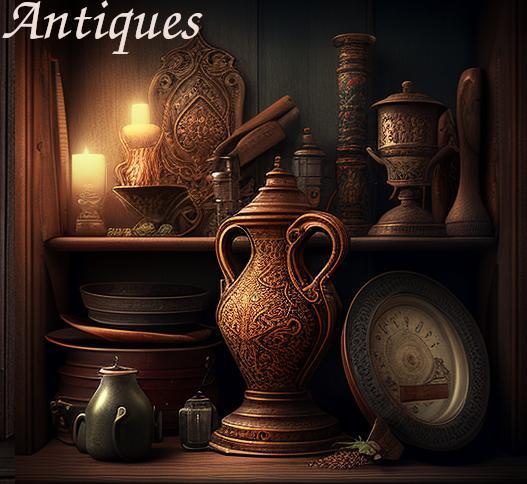








Antiques are more than just artifacts from the past; they are windows into history, capturing the craftsmanship and stories of bygone eras. Whether you're a seasoned collector or a novice enthusiast, understanding the world of antiques is an exciting journey filled with unique discoveries. This comprehensive guide aims to provide valuable insights and tips for navigating the realm of antiques, helping you appreciate, acquire, and care for these timeless treasures.
Research and Education:
Before diving into the world of antiques, invest time in research and education. Learn about different periods, styles, and materials used in antique craftsmanship. Books, online resources, and visits to museums or specialized exhibitions can enhance your knowledge and help you make informed decisions.
Identify Your Interests:
Antiques span a vast array of categories, including furniture, art, ceramics, textiles, and more. Identify your specific interests within the antique realm to focus your collecting efforts. Whether it's Victorian furniture, Art Deco jewelry, or ancient artifacts, having a niche allows you to become a more knowledgeable collector.
Authenticity Matters:
Authenticity is paramount in the world of antiques. Familiarize yourself with the hallmarks, signatures, and distinguishing features of specific periods or makers. Consult experts or join antique collector forums to seek guidance and validation for your potential acquisitions.
Condition and Restoration:
Assessing the condition of an antique is crucial. While some collectors appreciate pieces in their original state, others may be open to well-executed restoration. Understand the difference between wear, damage, and restoration to make informed decisions about the pieces you choose to acquire.
Know Your Budget:
Establish a budget before delving into the world of antiques. Prices can vary significantly based on rarity, condition, and provenance. Knowing your budget helps narrow down your options and prevents overspending on impulse purchases.
Attend Antique Shows and Auctions:
Antique shows and auctions are excellent venues for discovering unique pieces and engaging with knowledgeable dealers. Attend local and international events to explore a wide variety of antiques, ask questions, and gain exposure to different styles and periods.
Build Relationships with Dealers:
Developing relationships with reputable dealers can be invaluable for an antique collector. Establishing trust and rapport with dealers can lead to access to exclusive pieces, expert advice, and potential discounts. Attend antique fairs, visit antique shops, and engage in conversations with knowledgeable professionals in the field.
Preservation and Care:
Antiques require proper care to maintain their beauty and value. Protect pieces from direct sunlight, extreme temperatures, and humidity. Regularly dust and clean items using gentle methods recommended for specific materials. Be cautious with cleaning methods, especially for delicate surfaces.
Document Your Collection:
Create a detailed inventory and documentation of your antique collection. Include photographs, descriptions, provenance details, and any appraisals or certificates of authenticity. This documentation is not only helpful for insurance purposes but also serves as a record of your collecting journey.
Stay Open to Learning:
The world of antiques is vast and ever-evolving. Stay open to learning and evolving your collecting interests. Attend lectures, join collector groups, and stay informed about emerging trends and discoveries in the antique world.
Visit Antique Shops Regularly:
Frequent visits to antique shops, both local and international, can lead to unexpected finds. Merchandise in antique shops is often rotated, providing a continuous stream of new pieces for collectors to explore.
Trust Your Instincts:
While knowledge is crucial, trusting your instincts is equally important. If a piece speaks to you, resonates with your aesthetic, and fits within your collecting focus, it may be worth considering, even if it deviates from conventional wisdom.
Antiques are items that are at least 100 years old and have historic, aesthetic, or cultural value. These items can include furniture, art, ceramics, glassware, textiles, and other decorative objects.
Antique dealers are professionals who specialize in the buying, selling, and trading of antique items. They often have a deep knowledge of the history and value of antiques and are able to identify and authenticate items that may be difficult for others to recognize. Antique dealers may own their own shops or operate online, and they may attend auctions, estate sales, and other events to source new items for their collections.
Antique dealers play an important role in preserving and promoting the value of antique items, as they help to ensure that these items are properly cared for and appreciated. They also help to connect collectors and enthusiasts with rare and unique pieces that they may not be able to find on their own.
Antique dealers may also offer services such as appraisals, restoration, and conservation to help ensure that antique items are properly maintained and preserved for future generations to enjoy. Antique dealers are a vital part of the antique industry, helping to keep the past alive and thriving in the present.
The value and desirability of antique items can vary depending on a variety of factors, including rarity, age, condition, and historical significance. However, here are some categories of antique items that are generally considered to be among the most valuable and sought-after:
Furniture: Fine antique furniture can be highly valuable, especially if it is made by a well-known or highly regarded craftsman. Pieces that are in good condition and have unique features or decorative elements can be especially valuable.
Jewelry: Antique jewelry, including pieces made with precious metals and gemstones, can be highly sought-after by collectors and enthusiasts. The value of antique jewelry can vary widely depending on the quality of the materials and craftsmanship, as well as the rarity and historical significance of the piece.
Art: Antique art, including paintings, sculptures, and other decorative objects, can be highly valuable, especially if the piece was created by a well-known artist or is from a particular period or style. The condition of the piece, as well as its provenance and historical significance, can also play a role in determining its value.
Ceramics: Antique ceramics, including pottery, porcelain, and other decorative objects, can be highly valued for their beauty, craftsmanship, and historical significance. Pieces that are rare or in good condition can be especially valuable.
Textiles: Antique textiles, including rugs, tapestries, and quilts, can be highly valuable, especially if they are in good condition and have unique or intricate designs. Pieces that are from a particular period or culture can also be especially valuable.
(!) Collectors and enthusiasts often have their own individual preferences and areas of interest, which can also impact the value and demand for certain items.
The antique sector is subject to various legal regulations, which aim to protect the interests of collectors, dealers, and the general public. Here are some examples of the legal considerations that are relevant to the antique sector:
Import and export regulations: Many countries have regulations in place that govern the import and export of antique items, particularly those that are considered to be cultural or historical treasures. These regulations may require permits or licenses for certain types of items and may restrict or prohibit the trade of items that are deemed to be particularly valuable or culturally significant.
Authenticity and provenance: The authenticity and provenance of antique items can be important legal considerations, particularly in cases where there are disputes over ownership or the value of an item. Collectors and dealers may be required to provide evidence of the origin and history of an item and may be subject to legal action if they knowingly sell or trade counterfeit or fraudulent items.
Intellectual property: Intellectual property laws may also come into play in the antique sector, particularly in cases where items are reproductions or imitations of original designs or works. Copyright laws, for example, may restrict the production or sale of reproductions of copyrighted works, such as paintings or sculptures.
Consumer protection: Laws related to consumer protection may also be relevant in the antique sector, particularly when it comes to the sale and marketing of antique items. Collectors and dealers may be required to disclose information about the condition, history, and authenticity of an item, and may be subject to legal action if they engage in deceptive or fraudulent practices.
The legal considerations in the antique sector can be complex and varied, and collectors and dealers must be aware of the relevant regulations and laws in order to operate ethically and within the bounds of the law.
There are certain restrictions and practices that those in the antique business must avoid in order to operate ethically and within the bounds of the law. Here are some examples:
Sale of counterfeit or fraudulent items: Collectors and dealers must ensure that the items they are selling are authentic and accurately represented. Selling counterfeit or fraudulent items can result in legal action, as well as damage to one's reputation and business.
Deceptive or misleading advertising: Collectors and dealers must avoid using deceptive or misleading advertising practices, such as making false claims about the age or origin of an item, or misrepresenting its condition or value.
Trade in items that are illegally obtained: Collectors and dealers must avoid trading in items that have been illegally obtained, such as those that have been stolen or looted from archaeological sites or cultural institutions.
Violation of import and export regulations: Collectors and dealers must comply with the relevant import and export regulations when trading in antique items, including obtaining the necessary permits or licenses and following the proper procedures for shipping and handling.
Engaging in unethical practices: Collectors and dealers must avoid engaging in unethical practices, such as price fixing or collusion, or engaging in conflicts of interest, such as purchasing items from themselves or their associates.
(!) Those in the antique business must operate with integrity and follow ethical and legal guidelines in order to maintain the reputation of the industry and ensure the preservation and protection of cultural heritage.
Antiques are not just possessions; they are gateways to the past, carrying stories and craftsmanship that transcend time. By incorporating these tips into your collecting journey, you can navigate the world of antiques with confidence, passion, and a deep appreciation for the artistry of yesteryears. Embrace the adventure of discovery, let each piece tell its unique tale, and enjoy the richness that antiques bring to your life.
Yours truly,

We use cookies
We use cookies and other tracking technologies to improve your browsing experience on our website, to show you personalized content and targeted ads, to analyze our website traffic, and to understand where our visitors are coming from. Privacy Policy.
